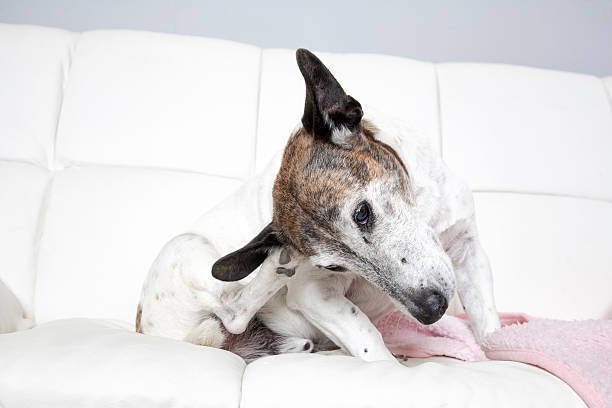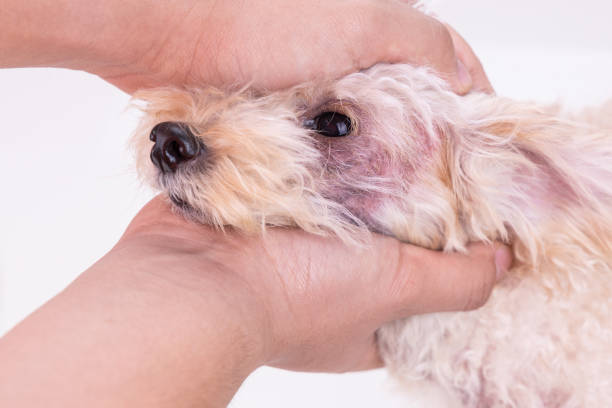Fleas are common parasites that survive by ingesting the blood of mammals, including that of humans. They are more than just a nuisance—they have the potential to spread diseases which could lead to illness or even severe health complications. Keep reading for tips on keeping your home free from fleas and for crucial information you should know about them infesting your puppies!
Fleas can affect not just your home but also your pets.
Symptoms of Flea Bites on Dogs
If you suspect your dog has fleas, it is essential to be aware of the symptoms associated with this condition. These parasites usually result in small red bumps on your pet’s skin.
- These bumps are often accompanied by itching. In severe infestation cases, dogs may develop a more extensive rash, including hair loss. A dog with fleas may also tend to scratch frequently or chew on the affected area.


How can you treat your dog if it has fleas?
Fortunately, several treatments are available for your pet if it is infested with these parasites. It is generally recommended that you consult a veterinarian before using any medication or product designed to eliminate fleas on your dog. This is important because the wrong method could make the condition worse.
To prevent future infestation, you should also wash all of your dog’s bedding and regularly vacuum your home.
As stated above, fleas have a higher risk of being bitten by puppies. If you have a new puppy in the house, it is vital to prevent infestation as soon as possible. It would be best to begin by ensuring that his bedding is clean and that he has toys or other items that he can chew on when he is not sleeping. You will also need to be more vigilant when cleaning your home, as puppies are much more likely to attract fleas.
You may also check out: Review: Billy No Mates Herbal Repellent for Dogs
What are the signs of flea infestation in puppies?
Puppies infested with these parasites tend to scratch or chew at their skin more frequently than usual. They may also develop skin sores that result from constant scratching and chewing. In very severe cases, a dog may experience hair loss as a result of a flea infestation.
Also read: What is Neem: A Natural Pest Killer


How can you prevent your puppy from getting fleas?
Puppies are more susceptible to infestations because they are less likely to get rid of these parasites on their own. If you have a pet, make sure all its bedding is clean and regularly vacuumed. It would help if you also washed your hands after handling your dog.
When should you take your dog to the vet if it has fleas?
Just as with humans, dogs can develop a condition known as anaemia from infestations with fleas. In some cases, this may require professional treatment by a veterinarian. If your puppy experiences any of the symptoms listed above and does not seem to be going away, you should take them to a veterinarian as soon as possible.
What are the treatment options for dogs with fleas?
If your dog has been infested with these parasites, there are many treatments that your vet may recommend. In general, products that can be applied directly to your dog’s fur and contain ingredients such as pyrethrin and permethrin are most effective. While these treatments can be helpful, they should not be used if your pet has any open wounds or is sick.
Note that the use of flea collars on dogs is controversial for several reasons. These collars may cause skin problems, and they may even cause the dog to become ill. In many cases, a flea collar can be quite pricy and offer very little in the way of results.


Some Tidbits for Keeping Your House Free from Fleas
Eliminate fleas outdoors. Fleas tend to live outdoors in areas where rodents live, such as piles of wood or rocks. If you see small mounds that resemble dirt, the chances are that they are rodent nests and could contain flea eggs. It would help if you treated these areas with a pesticide and then cleaned up the droppings to prevent re-infestation
Eliminate fleas indoors. Flea larvae tend to live in moist areas, such as carpeting and rugs. It is also a good idea to vacuum any particularly damp areas of your home, such as attics or basements.
Related read: How Detoxing Your Dog and Their World Can Help Scratch that Itch
Conclusion
Fleas can be tricky to eradicate, especially if you have a young pup. While it may seem like these pests are harmless at first glance, they could potentially carry diseases that lead to illness or worse. In this article, we’ve provided tips on keeping your house free of fleas and what you need to know about their presence on puppies.


